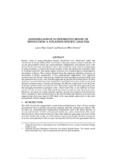ASSESSING KENYA’S COOPERATIVE MODEL OF DEVOLUTION: A SITUATION-SPECIFIC ANALYSIS
Abstract
Kenya’s form of quasi-federalism termed devolution was introduced under the Constitution of Kenya (2010) (‘2010 Constitution’). This governance system establishes 47 county governments which are constitutionally independent sub-national units with direct election of county level leaders. Given the complexity of devolution’s relationship to national politics, as well as the broad variation in how devolution has unfolded in the 47 counties since 2013, this article argues in favour of a situation-specific assessment of devolution in Kenya. This analysis departs from the emerging scholarly consensus of devolution in Kenya represented in two predominant approaches. One approach contends that devolution in Kenya has simply devolved corruption and patronage from the national to the county level. Another approach argues that devolution has so far been relatively successful because it has introduced a new political system at the county level that has a robust system of checks and balances but that has empowered a new dynamic in Kenya’s politics at the sub-national level. This article argues the first approach paints the emerging devolution experience with a broad brush that is not reflected in every county or even on every issue. This article has more in common with the second view. However, we argue for a more situation-specific, case by case analysis of devolution to show variations in how devolution has or has not facilitated the delivery of services and opportunities that were prior to 2013 likely to be unavailable particularly in the most economically disadvantaged counties.

